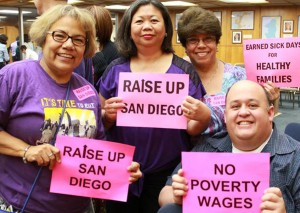Workers celebrate, businesses oppose San Diego’s minimum wage increase

This week, San Diego became the largest city in the United States to pass a minimum wage hike and earned sick days policy, but workers’ groups say it is not enough while business-owners say it is too much.
During the Monday, July 14th, San Diego City Council meeting, the city council voted 6-3 in favor of an ordinance that will set San Diego’s minimum wage at $11.50 implemented over three years every January 1, increasing to $9.75 in January 2015, $10.50 in January 2016 and $11.50 in January 2017, and indexed to the Consumer Price Index (CPI) starting January 1, 2019.
The ordinance also includes access to 5 days of earned sick leave for hundreds of thousands of employees in San Diego who currently do not have access to earned sick leave.
“This is a great day for the city”, said Councilmember Marti Emerald, who represents District 9, which includes areas such as City Heights, a diverse working-class neighborhood.
“Workers will have more money in their pockets to better provide for themselves and their families, and when they are sick they will be able to stay home and rest instead of having to choose between going to work ill or losing a day’s pay,” she said.
Councilmember David Alvarez, from District 8, which includes areas such as Barrio Logan and San Ysidro, both working-class neighborhoods, said that he’s been a strong supporter of workers’ right, having come from a working class family.
“I am proud to support the increase in minimum wage in the City of San Diego,” he said. “This is a concept and a philosophy that I have always supported — the idea that all San Diegans deserve access to sick days and a livable wage.”
Raise Up San Diego, a group in favor of workers’ rights, celebrated the minimum wage hike.
“Tonight, Council passed the strong workforce measure!” posted the group to its Facebook page the night of the vote. “It will raise the local minimum wage to $11.50 per hour and provide access to 5 earned sick days for local workers. Thank you especially to the workers who came and advocated on behalf of the more than 172K who will receive a raise and the 279K who will now have access to earned sick days.”
But not all workers groups were thrilled with the hike.
In a statement published before the San Diego City Council passed the measure on Monday, July 14th, the Coalition for Labor and Community Solidarity, a group of workers in San Diego, said that $11.50 just isn’t enough for workers to support their families.
“CLCS is disappointed that the City Council, under the leadership of Todd Gloria, has lowered the previous proposal on the table of $13.09 an hour to $11.50 an hour,” read the statement. “This was done behind closed doors, without consultation with community–based groups or with working-class communities in San Diego, and apparently only to appease the business community. Workers across the city have told us that they are worth more than this proposal and that it is an unfortunate and unnecessary retreat.”
The San Diego Regional Chamber of Commerce also voiced its opinion against the minimum wage increase but for very different reasons. The chamber of commerce said in a statement that this will affect businesses and overall will hurt San Diego.
“The San Diego Regional Chamber of Commerce remains deeply concerned about the negative impacts a city mandated minimum wage increase will have on San Diego businesses,” said in a statement Jerry Sanders, San Diego Regional Chamber of Commerce President and CEO. “Raising San Diego’s minimum wage and sick leave above and beyond what the state has already mandated puts San Diego at a competitive disadvantage compared to nearby cities.”
Sanders said that “the Chamber is seriously discussing with the business community the options available to further oppose the Council’s rushed decision that did not give the public adequate time to respond. We will be making a decision as to what option we will move forward with very soon.”
Alvarez said that while some businesses might oppose to the hike, he said he knows this is the best for San Diego families.
I have taken to heart that some people are afraid of what’s next with this ordinance. I’m afraid of what’s now,” he said. “I know that people go to work sick now, because they don’t have another choice. “I believe we all want a thriving San Diego and I strongly believe this policy achieves that goal.”





